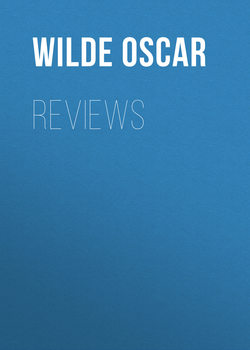Читать книгу Reviews - Оскар Уайльд, Wilde Oscar, F. H. Cornish - Страница 25
THE CENCI
Оглавление(Dramatic Review, May 15, 1886.)
The production of The Cenci last week at the Grand Theatre, Islington, may be said to have been an era in the literary history of this century, and the Shelley Society deserves the highest praise and warmest thanks of all for having given us an opportunity of seeing Shelley’s play under the conditions he himself desired for it. For The Cenci was written absolutely with a view to theatric presentation, and had Shelley’s own wishes been carried out it would have been produced during his lifetime at Covent Garden, with Edmund Kean and Miss O’Neill in the principal parts. In working out his conception, Shelley had studied very carefully the æsthetics of dramatic art. He saw that the essence of the drama is disinterested presentation, and that the characters must not be merely mouthpieces for splendid poetry but must be living subjects for terror and for pity. ‘I have endeavoured,’ he says, ‘as nearly as possible to represent the characters as they probably were, and have sought to avoid the error of making them actuated by my own conception of right or wrong, false or true: thus under a thin veil converting names and actions of the sixteenth century into cold impersonations of my own mind..
‘I have avoided with great care the introduction of what is commonly called mere poetry, and I imagine there will scarcely be found a detached simile or a single isolated description, unless Beatrice’s description of the chasm appointed for her father’s murder should be judged to be of that nature.’
He recognised that a dramatist must be allowed far greater freedom of expression than what is conceded to a poet. ‘In a dramatic composition,’ to use his own words, ‘the imagery and the passion should interpenetrate one another, the former being reserved simply for the full development and illustration of the latter. Imagination is as the immortal God which should assume flesh for the redemption of mortal passion. It is thus that the most remote and the most familiar imagery may alike be fit for dramatic purposes when employed in the illustration of strong feeling, which raises what is low, and levels to the apprehension that which is lofty, casting over all the shadow of its own greatness. In other respects I have written more carelessly, that is, without an over-fastidious and learned choice of words. In this respect I entirely agree with those modern critics who assert that in order to move men to true sympathy we must use the familiar language of men.’
He knew that if the dramatist is to teach at all it must be by example, not by precept.
‘The highest moral purpose,’ he remarks, ‘aimed at in the highest species of the drama, is the teaching the human heart, through its sympathies and antipathies, the knowledge of itself; in proportion to the possession of which knowledge every human being is wise, just, sincere, tolerant and kind. If dogmas can do more it is well: but a drama is no fit place for the enforcement of them.’ He fully realises that it is by a conflict between our artistic sympathies and our moral judgment that the greatest dramatic effects are produced. ‘It is in the restless and anatomising casuistry with which men seek the justification of Beatrice, yet feel that she has done what needs justification; it is in the superstitious horror with which they contemplate alike her wrongs and their revenge, that the dramatic character of what she did and suffered consists.’
In fact no one has more clearly understood than Shelley the mission of the dramatist and the meaning of the drama.
And yet I hardly think that the production of The Cenci, its absolute presentation on the stage, can be said to have added anything to its beauty, its pathos, or even its realism. Not that the principal actors were at all unworthy of the work of art they interpreted; Mr. Hermann Vezin’s Cenci was a noble and magnificent performance; Miss Alma Murray stands now in the very first rank of our English actresses as a mistress of power and pathos; and Mr. Leonard Outram’s Orsino was most subtle and artistic; but that The Cenci needs for the production of its perfect effect no interpretation at all. It is, as we read it, a complete work of art – capable, indeed, of being acted, but not dependent on theatric presentation; and the impression produced by its exhibition on the stage seemed to me to be merely one of pleasure at the gratification of an intellectual curiosity of seeing how far Melpomene could survive the wagon of Thespis.
In producing the play, however, the members of the Shelley Society were merely carrying out the poet’s own wishes, and they are to be congratulated on the success of their experiment – a success due not to any gorgeous scenery or splendid pageant, but to the excellence of the actors who aided them.
